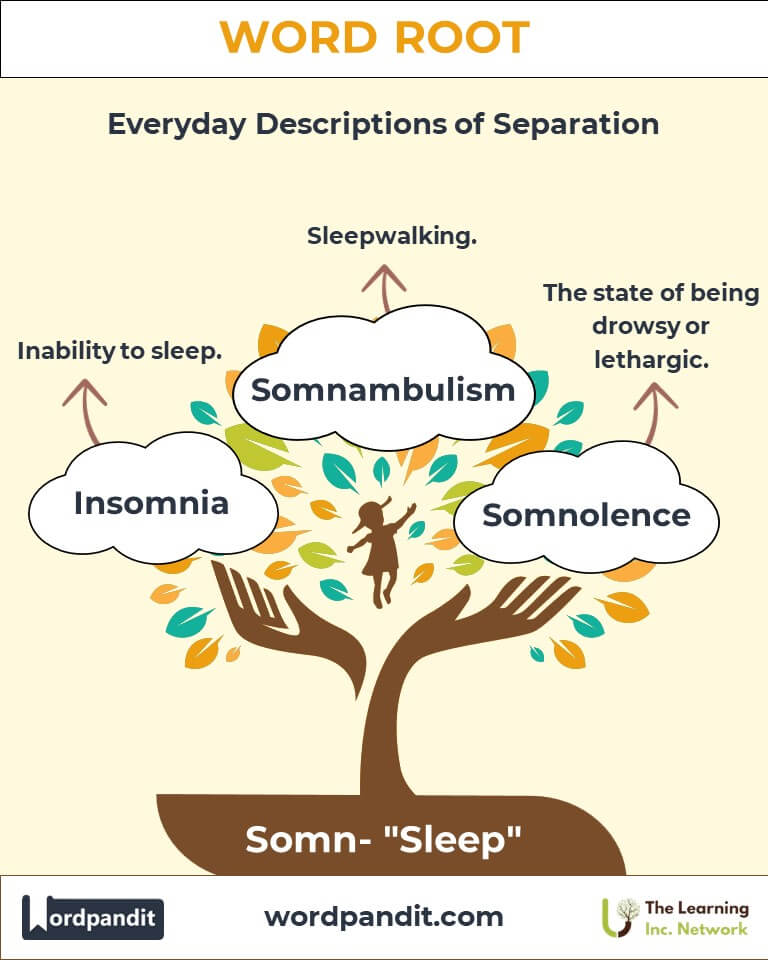Somn: The Root of Sleep in Language and Culture
Explore the fascinating root "Somn," derived from Latin, meaning "sleep." From insomnia to somnolent, this root has woven its way into words that describe rest, its absence, and everything in between. Dive into the etymology, specialized terms, and cultural significance of this linguistic cornerstone.

Table of Contents
- Introduction: The Essence of "Somn"
- Etymology and Historical Journey
- Mnemonic: Unlocking the Power of "Somn"
- Common Somn-Related Terms
- "Somn" Through Time
- "Somn" in Specialized Fields
- Illustrative Story: "Somn" in Action
- Cultural Significance of the "Somn" Root
- The "Somn" Family Tree
- FAQs About the "Somn" Word Root
- Test Your Knowledge: "Somn" Word Root Quiz
- Conclusion: The Living Legacy of "Somn"
Introduction: The Essence of "Somn"
Imagine the tranquility of a peaceful night’s rest or the frustration of sleeplessness. The root "Somn" (pronounced "sahm") embodies the concept of sleep. Originating from Latin, it appears in words that describe not only sleep itself but also its disorders and characteristics, making it a vital part of medical and poetic vocabularies alike.

Etymology and Historical Journey
The root "Somn" traces back to the Latin word somnus, meaning "sleep." In Roman mythology, Somnus was the personification of sleep, akin to the Greek god Hypnos. Over centuries, "Somn" found its way into Old French and Middle English, influencing terms like insomnia and somnolence in modern English.
Mnemonic: Unlocking the Power of "Somn"
To remember "Somn," picture a cozy bed with a soft pillow and the word "SOMN" stitched into a dream cloud floating above.
Mnemonic Device:
“Somn—Softly Over Moonlit Nights, signaling sleep.”
Common Somn-Related Terms
- Insomnia (in-som-nee-uh):
Definition: Inability to sleep.
Example: "After drinking coffee late at night, she struggled with insomnia." - Somnolent (som-nuh-luhnt):
Definition: Drowsy or sleepy.
Example: "The somnolent lecture made the students yawn." - Somnambulism (som-nam-byoo-liz-um):
Definition: Sleepwalking.
Example: "His somnambulism often led him to wander the house at night." - Somniferous (som-nif-er-uhs):
Definition: Inducing sleep.
Example: "The doctor prescribed somniferous medication to help with her insomnia." - Somnolence (som-nuh-luhns):
Definition: The state of being sleepy or lethargic.
Example: "The heavy lunch caused a wave of somnolence during the meeting."
"Somn" Through Time
- Somnus (Roman Mythology): As the deity of sleep, Somnus was often depicted with wings, sprinkling sleep dust over the weary.
- Insomnia (Modern Era): Derived from Latin in (not) and somnus (sleep), it became a recognized medical condition in the 19th century as understanding of sleep disorders grew.
"Somn" in Specialized Fields
- Medicine:
Insomnia: Commonly treated in sleep medicine, focusing on behavioral therapy or pharmacological approaches.
Somnolence: Often a symptom in diagnosing conditions like sleep apnea or narcolepsy. - Literature:
Somnambulism: A frequent theme in Gothic literature, symbolizing subconscious fears and desires. - Pharmacology:
Somniferous: A term describing substances like valerian root or melatonin that promote sleep.
Illustrative Story: "Somn" in Action
Lila, a somnambulist, often found herself waking up in unusual places. One night, she dreamt of a serene meadow. When she woke up, she realized she had walked to the backyard. Seeking answers, she consulted a sleep specialist who explained her condition, prescribing somniferous tea. Over time, Lila’s sleep improved, and she no longer wandered in the night.
Cultural Significance of the "Somn" Root
Sleep, represented by "Somn," holds a profound place in human culture. Ancient rituals and myths often portrayed sleep as sacred or mysterious. Today, sleep remains a topic of fascination, from lullabies to modern research on sleep science.

The "Somn" Family Tree
- Hypn (Greek: sleep):
Hypnosis: A trance-like state resembling sleep.
Hypnotherapy: Therapy using hypnosis to address mental health issues. - Dorm (Latin: to sleep):
Dormitory: A place for sleeping.
Dormant: Inactive, as if asleep. - Sopor (Latin: deep sleep):
Soporific: Inducing profound sleep.
Sopor: A state of deep sleep or unconsciousness.
FAQs About " Somn "
Q: What does the root "Somn" mean?
A: The root "Somn" means "sleep" and is derived from the Latin word somnus. It forms the basis of many terms related to sleep, including its disorders and characteristics, and is widely used in medical, literary, and everyday contexts.
Q: What is the origin of "Insomnia"?
A: "Insomnia" comes from the Latin prefix in- (meaning "not") and somnus (meaning "sleep"). It describes the condition of being unable to sleep, often due to stress, medical issues, or other factors.
Q: What is the difference between "Somnolence" and "Somniferous"?
A:
- Somnolence: Refers to a state of being drowsy or sleepy, often as a symptom of fatigue or a medical condition.
- Somniferous: Describes something that induces sleep, such as a sedative or calming environment.
Q: Is "Somnambulism" different from regular sleepwalking?
A: No, "Somnambulism" is simply the formal medical term for sleepwalking. It refers to the act of walking or performing complex behaviors while in a sleep state, usually without awareness.
Q: What does "Somnolent" mean, and how is it used?
A: "Somnolent" means drowsy or inducing a sleepy state. It can describe a person who is extremely tired or an environment (e.g., a lecture or atmosphere) that makes people feel sleepy.
Q: Are there natural somniferous substances?
A: Yes, natural somniferous substances include chamomile tea, valerian root, and lavender, all of which are known for their calming effects that promote sleep.
Test Your Knowledge: " Somn " Mastery Quiz
1. What does the root "Somn" signify?
2. Which term means "sleepwalking"?
3. What is a somniferous substance?
4. What is the opposite of "Insomnia"?
5. What does "Somnolent" describe?
Conclusion: The Living Legacy of "Somn"
The root "Somn" connects us to the universal experience of sleep. From medical advances addressing sleep disorders to its cultural and literary representations, "Somn" underscores the importance of rest in our lives. Let this root remind you of the beauty of dreams and the necessity of a good night’s sleep.














